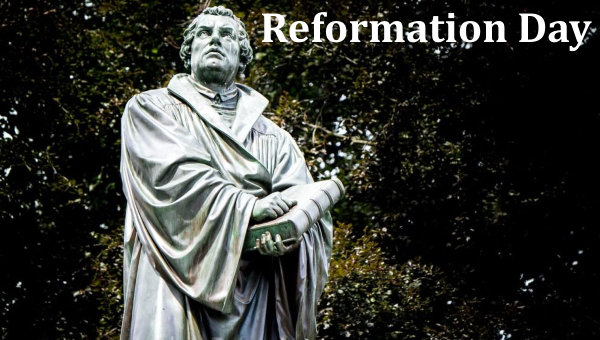By Tyson Thorne

There was a cold wind coming off the Elbe river that night. Martin Luther raised his collar against the chill and quickly skipped up the steps of the Castle Church in Wittenberg, Germany. Taking a hammer and pin, he unrolled his 95 theses, written carefully in Latin, and tacked them to the church door. While change had been in the wind for some time, this action sparked a storm of unprecedented strength. For over one thousand years the Catholic church was the only Christian church in the world, and while some had broken away this simple mission of Luther's would change Christendom -- and the world -- forever.
Today marks the 500th Anniversary of that famous moment in 1517, and from that day the protestant church was conceived. Not since the birth of the church itself whose history is relayed in The Acts of the Apostles has there been such an advancement of the kingdom of God. There are some interesting parallels between these two seminal events as well. Paul, who calls himself a Jew of Jews, was part of the corrupt religious order responsible for the crucifixion of Jesus and persecution of followers. Likewise, Martin Luther was a Catholic monk, again a part of the corrupt religious order, who is turned around and champions the truth of Scripture. Paul spoke to leaders, who tried to have him killed and whose attempts he repeatedly escaped. Luther's life too was in danger from his religious superiors which he also escaped. Finally, Paul's work lead to the vast expansion of Christianity throughout the Roman empire, and Luther expanded Christianity and access to the Bible throughout Germany and beyond.
In large part, both movements began as a reorientation of the existing religious order and resulted in a breaking away of which both parts survived. Judaism continues to exist to this day, as does the Roman Catholic Church. Both offer a better understanding of God now than they did before the conflict. This is due in part (on both counts) as the importance of Scripture became a renewed priority. In the New Testament era, Judaism had become focused on religious orders and rules instead of on the Word of God, and while the same could be said of Catholicism it's corruption ran along the lines of wealth and power. Unlike Judaism which was under the authoritative thumb of Rome, there was no real challenge to the authority of the Catholic Church throughout Europe and the Near East. All this is to say that the two moments in history were so strikingly similar that men of faith were capable of leading and restoring the important truths of God.
Rather than being Halloween, for Protestant Christians today is Reformation Day. Take the time to research and examine the great stories and history from the reformation period and the towering faith of the men who brought it to pass and to whom we owe so much. Perhaps instead of decorating your yard and home with the symbols of death and monsters, we should adorn our own doors with the 95 Thesis. Maybe we could even pass out the Gospel of John along with candy to those who knock on our doors. Please don't go full sola Scriptura and forget the candy though, unless you want your house egged. Standing on Scripture alone is good for one's faith, but not so good if you want to keep your trees from being TP'd.
We will be looking at benefits of the reformation period over the next couple days, including tomorrow (All Saints Day).
|
|
